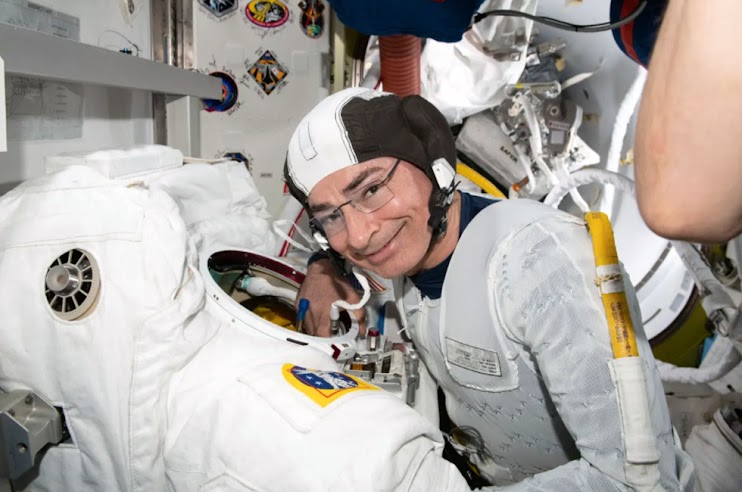 |
| US Russia Space Image Credit |
Mark Vande Hei, a US astronaut who has spent nearly a year in space, is about to embark on his most difficult mission yet: returning to Earth on a Russian capsule amid rising tensions between the two countries.
Even though Russia's invasion of Ukraine has resulted in canceled launches, violated contracts, and a growing war of words by the Russian Space Agency's hardline chief, NASA assures that Vande Hei's homecoming plans for the end of the month remain unaltered. Many people are concerned that Dmitry Rogozin is risking decades of peaceful cooperation outside the earth, particularly at the International Space Station.
Vande Hei, who broke the US single-spaceflight record of 340 days on Tuesday, is scheduled to launch alongside two Russians aboard a Soyuz capsule on March 30 for a landing in Kazakhstan. By then, the astronaut will have spent 355 days in space, a new American record. Russia holds the global record for the longest period of time spent in space at 438 days.
Scott Kelly, a retired NASA astronaut who set the world record until Tuesday, is one among those clashing with Rogozin, a longstanding Putin ally. Kelly has returned his Russian medal for space exploration to the Russian Embassy in Washington, enraged by the situation in Ukraine.
Kelly believes that, despite the deadly struggle on Earth, the two sides can "keep it together" in space.
"We need to set an example that two countries that haven't always been on the best of terms can still work along happily." The International Space Station is located someplace there. That is why we must fight to maintain it," Kelly said to the Associated Press.
NASA, as well as the European, Japanese, and Canadian space agencies, plan to keep the space station operational until 2030, while the Russians have not committed beyond the original end date of 2024 so about.
The orbiting station has been permanently occupied for 21 years, and the primary operators are the United States and Russia. Americans used to hitch rides on Russian Soyuz capsules for tens of millions of dollars per seat before SpaceX began launching passengers in 2020. The US and Russian space agencies are still working on a long-term barter arrangement in which a Russian would fly upon the Soyuz and an American would launch on a SpaceX spacecraft starting this fall. This would assist ensure the presence of US and Russian stations at all times.
 |
| US Russia Space Station. Image Credit |
Vande Hei, a 55-year-old retired Army colonel, arrived in the space station in April after launching alongside Pyotr Dubrov and another Russian on a Soyuz from Kazakhstan. To accommodate a Russian film crew who visited in October, he and Dubrov stayed twice as long as normal.
Last month, as the situation 260 miles (420 kilometers) below worsened, Vande Hei admitted to avoiding discussions on Ukraine with Dubrov and their Russian commander, Anton Shkaplerov. To replace them, three additional Russians will leave Kazakhstan on Friday.
"We haven't discussed it too much." In mid-February, Vande Hei told a TV journalist, "I'm not convinced we really want to go there."
According to NASA, space station operations are continuing as usual – both in orbit and on Earth.
"It would be a sad day for international operations if we couldn't continue to operate peacefully in space," NASA's human spaceflight head Kathy Lueders said, adding that going it alone would be "extremely tough."
NASA used Twitter to receive questions for video-recorded responses to commemorate Tuesday's milestone, and several wondered if Vande Hei would take an American flight home. At the end of March, SpaceX will fly three affluent business people and an ex-astronaut to the International Space Station for a brief visit. SpaceX will then deliver four men for NASA in mid-April before returning four astronauts who have been on board since November.
 |
| US Russia Space Station. Image Credit |
Heidemarie Stefanyshyn-Piper, a former NASA astronaut whose father was born in Ukraine, admits it's a tough issue.
"We're imposing sanctions on Russia." Companies are abandoning Russia as a place to do business. "However, the US government — the space agency — continues to do business with the Russians," she added. "You can't separate the two" sides of the space station by pushing a button.
Rogozin had the flags of other countries covered on a Soyuz rocket awaiting liftoff with internet satellites earlier this month, in addition to threatening to rip out of the space station and drop it on the United States, Europe, or elsewhere. After the customer, London-based OneWeb, rebuffed his demands that the satellites not be used for military purposes, the launch was canceled, and the British government canceled its financial support.
Also reeling is the European Space Agency. The project was on pace for a September launch from Kazakhstan after missing a 2020 launch goal for its Mars rover, which was a joint European-Russian operation. It's now most likely postponed until 2024 when Earth and Mars will be perfectly aligned for the first time. In addition, Russia has withdrawn its staff from the French-run launch site in South America, thus halting Soyuz satellite missions.
All of this comes after Russia's antisatellite missile test in November, which added many bits of debris to the debris already orbiting Earth and kept the four Americans, two Russians, and one German on the International Space Station on high alert for days.
With the first section of the space station launching in 1998, Jeffrey Manber, now with the private Voyager Space corporation, helped establish US-Russian ties in the mid-1990s. The outpost, he believes, is "one of the last bastions of partnership" between the two countries. "There is no going back if the cooperation is canceled and the ISS program is terminated prematurely," he warned.
Whatever happens at the space station, John Logsdon, a George Washington University professor emeritus, believes it will be the end of large-scale space collaboration between Russia and the West.
"Russia has already begun to shift toward China, and the current scenario will very certainly exacerbate that movement," he warned.
While Vande Hei has been mute on Twitter, Kelly and others have reacted angrily to Rogozin's threats.
Elon Musk's private SpaceX took issue at Rogozin after he warned Russia would stop selling rocket engines to two US businesses, Northrop Grumman and United Launch Alliance, and that they could reach orbit with broomsticks.
"Time to let the American broomstick fly and hear the sounds of freedom," a SpaceX official said during a recent launch.
Source: The Howard Hughes Medical Institute's Department of Science Education supports the Associated Press Health and Science Department. All content is entirely the responsibility of the AP. Toisthe collect news and furnish it.









0 Comments
please do not enter any spam link in the comment box